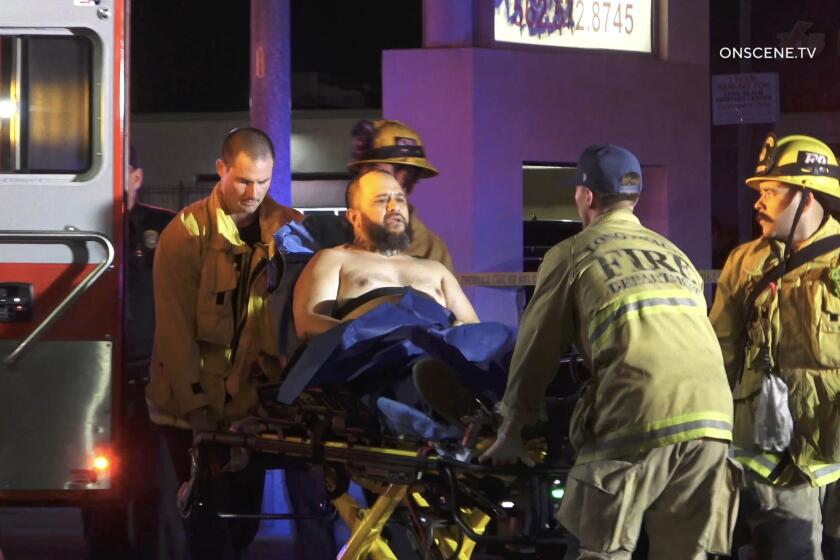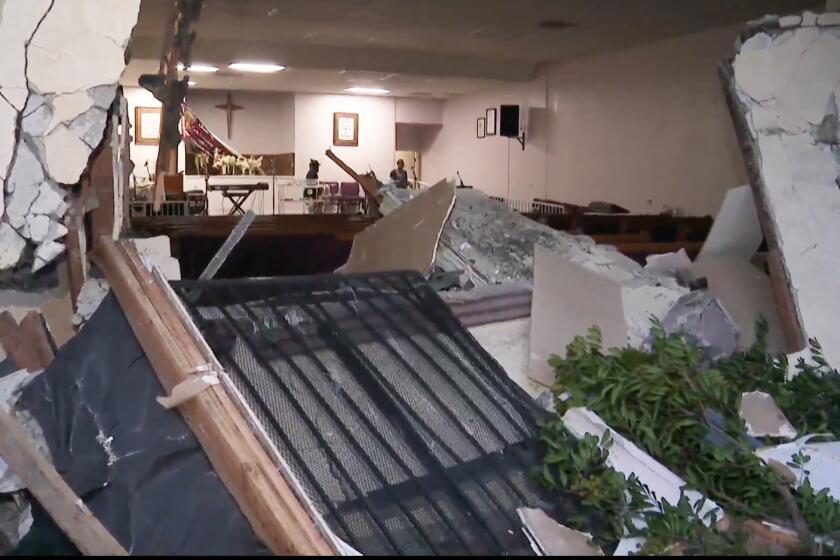DARE Programs Threatened as Cities Face Cutbacks
In a measure of the financial anxiety gripping cities this summer, some officials are gingerly aiming their budget ax in the direction of DARE, a popular drug education program that in the past decade has become as much a part of the school day as math and spelling.
Teachers, community groups and police are rallying to preserve Drug Abuse Resistance Education, but some say they fear that ever-tightening municipal budgets will eventually force cutbacks, maybe not this year but soon.
DARE and other community policing programs, including Neighborhood Watch, are vulnerable to cuts because they are among the few items in police department budgets that do not affect basic patrol services.
“Our first responsibility is emergency services and investigating crimes,” said Lt. Dan Johnson of the Huntington Beach Police Department, which has four officers assigned to DARE at an annual cost of about $340,000.
“DARE is a great educational program, but it is not an emergency response program,” he said. “So unfortunately, when we are required to make cuts, this is where they are made.”
Faced with a $4-million deficit this fiscal year, Huntington Beach officials considered slashing DARE funding by 50% or eliminating it altogether. But after public outcry, the City Council vowed to maintain funding at current levels.
The Garden Grove City Council will soon decide whether to cut that city’s DARE program by a third, reducing the number of students who receive anti-drug instruction.
Backers say cutting the program in the name of belt-tightening is shortsighted. They point out that most city DARE budgets total less than $400,000 a year--a small sum compared to the costs of processing troubled teens through the criminal justice system.
“It’s a well-spent investment in the future,” said Anaheim Councilman Lou Lopez, a city police investigator who opposed DARE cuts when he was a member of the Anaheim city school board.
“If you can teach Johnny to act correctly in fourth grade, he is going to be a productive adult,” Lopez said. “That’s good for society.”
Founded in Los Angeles 13 years ago, DARE has mushroomed into the leading youth anti-drug education effort, with programs in more than 5,000 communities nationwide. DARE operates in more than 500 Orange County schools.
The program’s structure is simple: Law enforcement agencies send specially trained “DARE officers” to local elementary and junior high schools, where they teach an anti-drug curriculum.
The officers tailor their lessons to each grade level, using guidebooks and teaching plans developed by the national DARE organization.
“It allows police officers and students to associate and bond in an educational and social atmosphere,” said Ron Russell, chairman of the Pride Foundation, a nonprofit Huntington Beach group that raises money for local DARE programs.
“Having a police officer at the school makes a big difference,” he said. “I don’t think a parent is able to provide this kind of training.”
That view is not universal, however. Several national studies, including one by the University of Illinois, found that DARE does increase a student’s knowledge. But there is little evidence that the program actually keeps them from using illegal substances.
Nonetheless, DARE is revered across Orange County, where backers insist that the lessons and personal contact with police officers have a deterrent effect.
In cities where cutbacks have been proposed, officials generally have cited financial problems as the reason and have not questioned the effectiveness of DARE.
Because of the investment losses in the county bankruptcy and other economic factors, the city of Placentia and the Placentia-Yorba Linda Unified School District cut their DARE program last year from three officers to one.
Placentia officials say they do not foresee additional cuts in the near future. But in other cities, leaders say that financial uncertainties leave many valuable programs vulnerable, including DARE.
Adding to the revenue crunch is the possibility that some cities could be forced to repeal utility and hotel bed taxes because of a recent California Supreme Court decision that might invalidate such levies unless they are approved by voters.
Buena Park Councilman Art Brown, a DARE supporter, said that the city’s program probably will survive this year but that continuing budget problems could eventually force reductions.
“I believe in DARE,” Brown said. “But it’s difficult. . . . I think having police on the streets is more important.”
More to Read
Start your day right
Sign up for Essential California for news, features and recommendations from the L.A. Times and beyond in your inbox six days a week.
You may occasionally receive promotional content from the Los Angeles Times.







